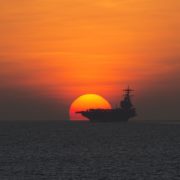ACCORDING to the Cabinet’s security cluster, the West Philippine Sea (South China Sea) dispute is the biggest concern with regards to the country’s sovereignty and territorial integrity.
The assessment was made as the security cluster unveiled the Duterte government’s National Security Policy during the pre-State of the Nation Address (SONA) conference on Wednesday, July 18, in Pasay City.
“The dispute over the West Philippine Sea remains to be the foremost security challenge to the Philippines’ sovereignty and territorial integrity,” it said.
It added that the Philippines “needs to address” the disputes over the country’s maritime borders “as they affect a complex range of national security concerns as well as threaten regional peace and stability.”
President Rodrigo Duterte, however, has maintained a non-confrontational stance in the West Philippine Sea dispute and has fostered economic ties with China since assuming the presidency — which prompted the security cluster to suggest treading with prudence on the issue by “carefully” calibrating all diplomatic approaches in resolving the issue.
According to it, diplomatic efforts would also avert costly consequences of any potential armed confrontations in the disputed waters.
“The government is looking to begin the process of diplomatic negotiations with neighboring countries to delimit and define maritime borders and jurisdictions,” the cluster said.
“In this connection, the enactment of laws pertaining to national defense, maritime zones, archipelagic sea lanes and all other matters necessary for compliance with the country’s commitments and obligations under international law is urgent and imperative,” it added.
Meanwhile, National Security Adviser Hermogenes Esperon Jr., who presented the Duterte government’s national security strategy, said more troops within the Kalayaan Island Group (Spratlys), Tawi-Tawi and Batanes have been deployed by the Armed Forces of the Philippines (AFP).
The military sent troops in the Philippine-occupied Pag-asa (Thitu) Island, Kota (Loaita) Island, Parola (Northeast Cay) Island, Likas (West York) Island, Patag (Flat) Island, Panata (Lankiam Cay) Island, Lawak (Nanshan) Island, Rizal (Commodore) Reef and Ayungin (Second Thomas) Shoal in Kalayaan, while military presence was “enhanced” in Mardanas and Panguan islands in Tawi-tawi.
According to Esperon, the military and the Department of National Defense (DND) had ordered naval surface patrols within Philippine territories, covering more than 180,000 nautical miles of the country’s maritime domain and more than 2,400 flying hours of maritime air patrol — although he did not divulge which territory of the country was covered by maritime patrols.
“Further, the DND began rehabilitation of structures in islands [of Kalayaan]. The construction of the beaching ramp and repair of runway in Pag-asa Island are now ongoing,” Esperon said.
“The government continues to engage China relative to our concerns in the West Philippine Sea, through high-level visits and meetings, including the bilateral consultation mechanism,” he added.
Esperon also said that the Philippines is ready to work for peace with China during the open forum of the pre-SONA conference.
“We are preparing for peace,” he said.
He said the national security strategy contains information regarding the government’s security efforts.
“The national strategy aims to achieve the ends of national security strategy which is the protection and enhancement of the well-being of the Filipino people, the protection of the territories, of sovereignty, the institutions, as well as the core values of the Filipino people,” Esperon said.





